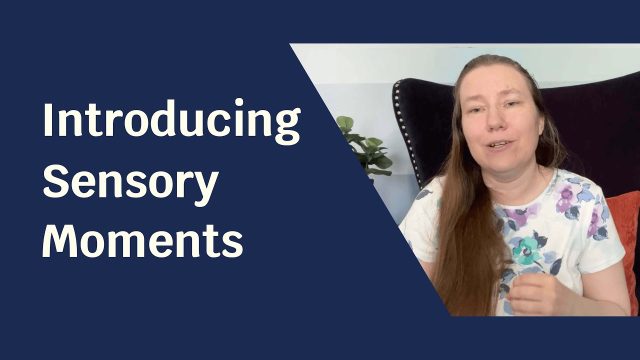Struggle recognizing your sensory needs?
For more info about Sensory Moments, or to sign up: https://www.autismchrysalis.com/sensory-moments/

Video transcript
Before I knew I was Autistic, the question, “How are you?” would spike my anxiety. I struggled with daily tasks like remembering to brush my teeth, and I hated doing it when I did. I often stayed up way too late because I couldn’t tell when I was tired. I resisted things I “should” do but couldn’t understand why. I pushed through pain, exhaustion, overwhelm, and sometimes I barely noticed them. And I burned out over and over.
When I figured out I’m Autistic, I struggled with all of the same things, but I began to understand why.
And after several years of exploring my sensory experiences, learning how to notice what was going on inside, and what to do about it, I finally know how to really answer the question, “How are you?” I figured out ways to manage life that doesn’t inflame my nervous system. So I brush my teeth just about every day. I go to bed when I’m tired. I built rest and energy restoring activities into my life. And so much more.
I still get overwhelmed sometimes. But I know better how to adjust things to work for me, and how to cope when there’s nothing to adjust.
Lots of us whose sensory processing experiences lie outside of the perceived norm, are trained as we grow up to ignore our internal signals of what we need because they’re inconvenient to the people and systems around us. And while that was effective in getting through early life, it leaves us not knowing what’s going on inside our own bodies, or even believing that what we feel is inappropriate, or wrong, like it shouldn’t matter, and that it’s not okay to adjust things to make them better.
There’s a lot of different aspects in there to unpack. I’m just going to address one part of that here. And that’s how to develop a more nuanced connection between things that happen, and how they affect you by recognizing what is going on inside your body in real time. And doing that without judgment, without shame, without making things feel worse. So many of my clients struggle with this that I developed Sensory Moments to help grow that internal awareness in a way that is gradual and gentle enough that it doesn’t overwhelm, that’s sensitive to trauma history, and that invites curiosity and openness. Sensory Moments is a series of emails that are super, super short. They take seconds to read. Each one is a simple prompt about noticing what’s going on in one body part, or what things around you are affecting how you feel in that moment. You don’t have to get up and do anything. There are no exercises. No goals. No “shoulds.” And no right or wrong. And there are built in options to adapt them to your unique circumstances.
How it works is by bringing your attention to what’s going on in the moment in one part of your body at a time. That’s really all that’s needed to expand your internal awareness. It takes attention, over time, without judgment.
It’s genuinely no more complicated than that. You can figure it out on your own, for free. That’s how I did it. But if little reminders are helpful, or if you’d like examples of questions that are useful in growing that awareness without triggering intensity or demand avoidance, that’s what I developed Sensory Moments for.
If this might be a good fit for you, you can find more info, and the link to sign up, [above].




